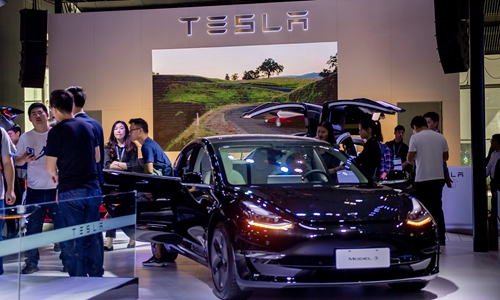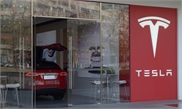Tesla angers Chinese-made Model 3 owners following announcement of long-range model

A Tesla Model 3 displayed at the Guangzhou Autoshow on November 22, 2019. Photo: VCG
Owners of Tesla's standard-range-plus Model 3, a version that the US electric vehicle (EV) giant started to produce in its Shanghai Gigafactory in December last year, felt "cheated and disappointed" after Tesla introduced the long-range version last week: a much-anticipated version in the Chinese market with 200 kilometers longer range than the standard one but just 13 percent higher in price.
A video went rival on Chinese social network Weibo on Monday showing a Tesla owner who just bought a standard-range-plus version telling a salesperson in a Tesla store the company should offer some explanation as to why the new-version came out on the heels of their delivery of the standard-range-plus version.
"We feel cheated," the owner said in the video. He came to the store with other Tesla owners who had just encountered the same thing: they were told delivery of the old version was ahead of schedule, meanwhile when they consulted Tesla's salespersons about the time that the long-range version will be locally produced in China, the answer they got varied - in the summer, by year end or maybe even not this year.
Tesla, however, officially released the long-range version last Friday. The company upgraded its China website showing the standard-range-plus version, the long-range rear-wheel-drive (RWD) version and the performance version of its Model 3.
The long-range RWD version starts at 339,050 yuan ($48,035) after subsides with a range of about 668 kilometers on one charge. That compares with about 450 kilometers for the entry-level version - the standard-range vehicle - that starts at 299,050 yuan after subsidies.
Deliveries of the long-range RWD version are expected to begin in June.
The price difference of 40,000 yuan between the two versions included more than 200 kilometers in range, a better audio system and upgraded interior.
Most old version owners would choose to wait for the new version if they had been given any launch information of it and they would have been willing to pay the extra 40,000 yuan to obtain a longer-range one, the Global Times learnt.
"I got my standard-range-plus Model 3 two weeks ago when they told me unexpectedly it was available as the delivery was originally scheduled in April," an old-version owner surnamed Lao based in East China's Zhejiang Province told the Global Times on Tuesday.
"Before I placed the order, I asked the Tesla salesperson if the long-range version would be released soon, he told me it would be in the second half of this year and it would cost 70,000 or 80,000 yuan more than the standard-range model. But I never expected the new version to be introduced so soon, I feel so angry and regretful," said Lao.
Another old-version owner surnamed Guo, who is based in Beijing, also asked a Tesla salesperson about when the long-range version would come out before he paid for a standard-range one at the end of last year.
"If I had known the new version was coming soon, I certainly would have waited. I chose a Tesla because of its mileage advantage which I need for long-distance travel, but now I am disappointed," said Guo, adding that he was confused by the irregular upgrade period of the highly digitalized EVs.
Guo noted that he wanted to exercise his consumer rights but did not know how to do so.
A Tesla salesperson in Beijing told the Global Times Tuesday that they were also not aware when the long-range version would be introduced, and some old-version owners had approached him to make complaints.
Tesla did not respond to the Global Times inquiry as of press time.
In a questionnaire by diandong.com, a domestic EV services platform, among a total of more than 150 old-version owners who claim to use their consumer rights, 34.1 percent wanted to exchange for the long-range model and pay the extra cost; 15.4 percent requested Tesla to compensate them by offering other services like its full-sell driving function; 4.1 percent said they would like to get a refund on the car.
Du Manqing, a lawyer of Guangdong Kingbridge Law Firm, told the Global Times Tuesday that if a sales contract does not promise that Tesla will not roll out a newer model or indicate that the product's hedging against risks of price reduction, then Tesla has done nothing illegal.
However, any verbal indications by Tesla salespeople about an uncertain date for the new version's launch to try to persuade consumers to buy the current line could breach relevant rules of unfair anti-competition laws, and might be provided as evidence for the court to consider.
A balance needed
It is not the first time that the US tech giant has encountered complaints by Model 3 owners either over abrupt reduction of prices or the product itself.
The Global Times reported in March that Chinese shoppers filed a collective complaint against Tesla as its made-in-China Model 3 electric sedans were found to offer a lower performance than promised without notice.
It is acknowledged that Tesla's EVs are quite competitive in the Chinese market, but it should also consider if frequent changes to its pricing strategy might disadvantage some owners, otherwise the brand will find it hard to stay at the front of the world's largest EV market, industry insiders said.
"Compared with internal combustion cars, intelligent EVs tend to show a rapid yet irregular pace in upgrading products, which might go beyond executives' planning," said Mei Songlin, a senior analyst at the auto industry.
"Despite the early exploration period, EV players still need to learn to strike a balance between their buyers' interests and the rollout of new products for the markets," Mei told the Global Times.
Tesla reached its highest monthly sales record in China in March with 10,160 units sold, compared with 3,563 units in January and 3,900 units in February, data from the China Passenger Car Association showed.
As the COVID-19 pandemic continues to weigh on the US economy, Tesla suspended its facilities in the US in March. Construction of the Gigafactory in Berlin is reportedly postponed.
Given the circumstances, Tesla is tilting its resources toward the Shanghai facility - where 3,000 units of Model 3 vehicles are produced every week, and it might explain why the firm was so eager to introduce the long-range version to attract more consumers in such a short time, according to Mei.
"The pandemic has disrupted the set planning for each market for such a transnational firm as Tesla. It needs to readjust based on the whole picture."
Model Y, the all-electric compact SUV built on Tesla's third-generation vehicle platform which was delivered in the US in March, might roll off the line in the Shanghai factory earlier than expected, said Mei.

